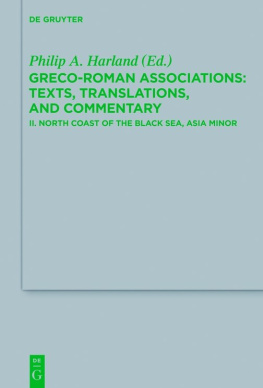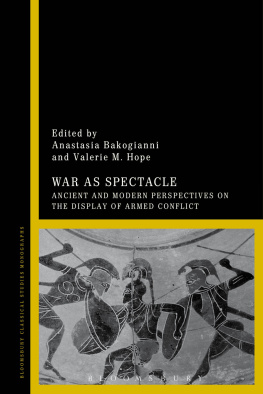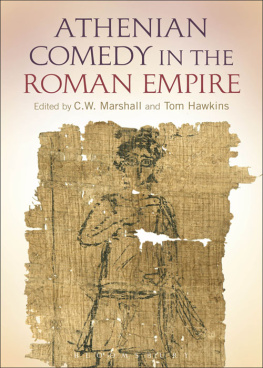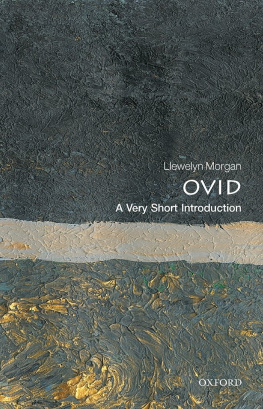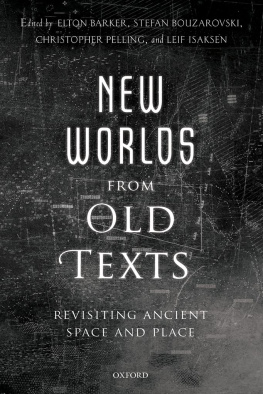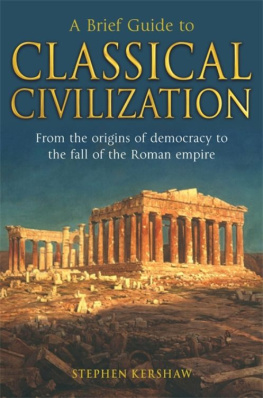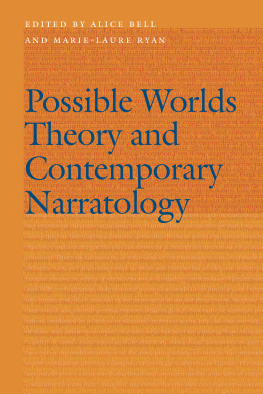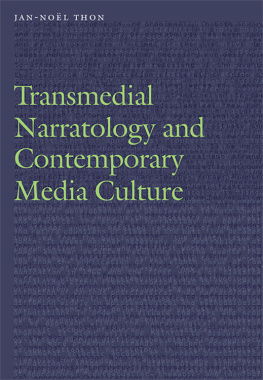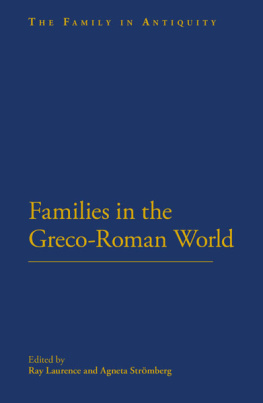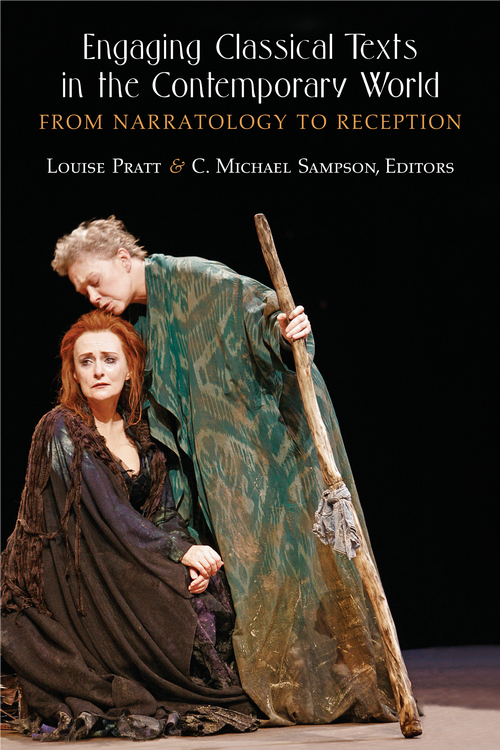
Engaging Classical Texts in the Contemporary World
Engaging Classical Texts in the Contemporary World
From Narratology to Reception
Louise Pratt and C. Michael Sampson, Editors
University of Michigan Press
Ann Arbor
Copyright 2018 by Louise Pratt and C. Michael Sampson
All rights reserved
This book may not be reproduced, in whole or in part, including illustrations, in any form (beyond that copying permitted by Sections 107 and 108 of the U.S. Copyright Law and except by reviewers for the public press), without written permission from the publisher.
Published in the United States of America by the
University of Michigan Press
Manufactured in the United States of America
A CIP catalog record for this book is available from the British Library.
Library of Congress Cataloging-in-Publication data has been applied for.
ISBN: 978-0-472-13108-2 (Hardcover : alk paper)
ISBN: 978-0-472-12442-8 (ebook)
For Ruth Scodel
Ruth Scodel grew up during the 1960s in the Haight-Ashbury district of San Francisco, where she encountered the counterculture and the revolutionary ideas of the era. Like the hippies, she gravitated across the bay toward the University of California Berkeley, where she matriculated in 1969. Following her undergraduate work, she proceeded to Harvard, where she received her PhD in 1978 and began her teaching career, as an assistant professor (197883) and then an associate professor (198485). Her dissertation on Euripides Trojan trilogy was published in 1980, and her articles from this period testify to the breadth of topics in archaic and classical literature that would largely occupy her scholarly attention: tragedy, Homer, poetic and mythological narrative, Hesiod, and lyric and epinician poetry. Secondary interests in Callimachus, encomium and epitaph, and Latin literature are also evident in her early work; to Latinists, she is best known to this day for the 1984 note Virgil and the Euphrates that she coauthored with Richard Thomas (AJP 105 [1984]: 339).
In 1984, Ruth moved to Ann Arbor and the University of Michigan, where her climb through the professorial ranks culminated in her 2005 appointment as the D. R. Shackleton Bailey Collegiate Professor of Greek and Latin. At Michigan, she edited volumes 11721 of Transactions of the American Philological Association (198791), as well as Theater and Society in the Classical World (University of Michigan Press, 1993), and authored the many monographs and articles that have solidified her standing as a preeminent Homerist and scholar of tragedy, including Credible Impossibilities (1999), Listening to Homer (University of Michigan Press, 2002), and Epic Facework (2008). In the last decade or so, she has branched out into film studiesmost notably in Whither Quo Vadis? (2009), coauthored with Anja Bettenworth. Ruth also continues to dig deeper into works she first investigated early in her career, particularly Hesiods Works and Days, and to explore further major themes of perennial interest: politics, memory, narratology, performance, and orality. Two edited volumes that appeared in 2014Between Orality and Literacy: Communication and Adaptationin Antiquity and, with Douglas Cairns, Defining Greek Narrativefurther testify to Ruths fertile engagement with these themes, as well as to the constant support she gives to other scholars, a support strongly felt by the contributors to this volume.
Though her command of ancient Greek poetry is formidable, Ruth recognizes and appreciates the sillier side of scholarship and does not always take herself so seriously, as exemplified by her dramatic turn as Hillary Clinton in an adaptation of Aristophanes (The Nerds) at the 2016 meeting of the Society for Classical Studies. Professionally speaking, Ruths record of service is long: in the American Philological Association (now the Society for Classical Studies), she has served in one capacity or another on an almost uninterrupted basis since 1982, culminating in terms as president-elect (2006), president (2007), and immediate past president (2008). At Michigan, she was a longtime director of graduate studies and chaired the Department of Classical Studies (200713), and her teaching, research, and mentoring have all been recognized with awards.
The range of subject matter and methodologies that are united in this collection reflects the diverse interests of our honorand: epic, tragedy, and film, on the one hand; theory of mind, politeness theory, narratology, and traditional philology, on the other. Though the studies included herein are diverse, their common concern for interactions and relationshipsbetween individual authors, between authors and audiences, between texts and genres, between traditions (literary, mythological, and historical), and between characters within textsreflects a variety of possible approaches one can take when interacting with antiquity. Ruth Scodel has been a leader in the effort to situate classics within a more diverse and inclusive intellectual community without losing sight of the philological rigor and clear writing that have been the traditional assets of the field. In this volume, we seek to honor this feature of her work, particularly her broad interests in interactions and relationships of many different kinds. This book is offered as a modest tribute in gratitude for Ruths influence and tutelage.
Contents
Louise Pratt and C. Michael Sampson
Bernd Steinbock
Louise Pratt
David D. Leitao
James H. Kim On Chong-Gossard and Lin Li Ng
Katherine Lu Hsu
James V. Morrison
Peter Bing
Amanda Regan
C. Michael Sampson
Rebecca A. Sears
Anja Bettenworth
Ricardo Apostol
This book is the product of several years work, and we are grateful to the many individuals who helped realize it. First and foremost among them are the ten other authors who contributed their scholarshipthe sine qua non of any publication. Colleagues at both of our institutions provided a sure sounding board for ideas: we single out Mark Joyal and Niall Slater for particular thanks. Anna Scodel and Bruce Frier provided input and advice on matters unrelated to the books contents, and throughout its production, we were supported by the University of Michigans Department of Classical Studies. Michelle Biggs initial assistance helped get the ball rolling, and the chairs of the departmentSara Forsdyke and, later, Artemis Leontishelped guide our plans. At the University of Michigan Press, Ellen Bauerle and Susan Cronin responded to countless inquiries over the course of many months. It was Ellen who first brought us together, and we are glad that she did.
The inspiration for this book will be obvious from its dedication. We only hope that our aspirations are not too far from the mark.
(Sophocles, Colchides, TrGF fr. 346)
For ancient authors and works, this volume follows the abbreviations listed in LSJ and OLD. For journals, it follows the conventions of LAnne philologique (with the obvious Anglicizing adjustments: e.g., TAPA); for epigraphic corpora, those of the Supplementum Epigraphicum Graecum; and for papyri, those of the Checklist of Editions of Greek, Latin, Demotic, and Coptic Papyri, Ostraca, and Tablets, available online (http://www.papyri.info/docs/checklist). The volume also employs the following abbreviations:
BDAG Montanari, F. 2015. The Brill Dictionary of Ancient Greek. English edition edited by M. Goh and C. Shroeder. Leiden.
Next page

